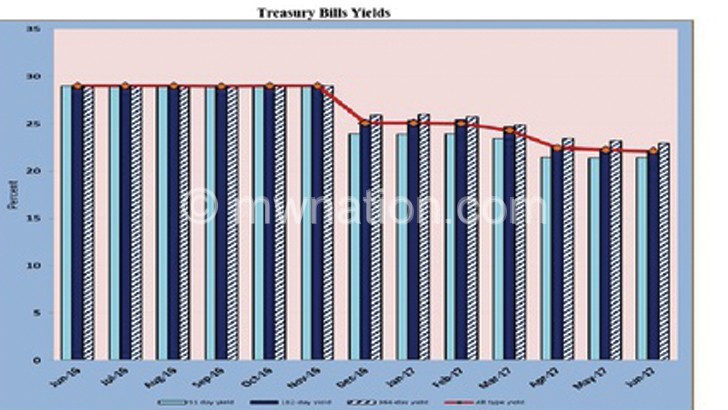G overnment raises k40bn in t-bills
The Reserve Bank of Malawi (RBM) has since the start of the 2017/18 financial year raised over K40.72 billion in Treasury bills (T-bills), a short-dated government security, according to available figures.
T-bills are a critical way for government to raise money without raising taxes, but has an effect of crowding out the private sector in terms of access to finance.
In the week ending July 6 2017, RBM raised K1.96 billion, K4.94 billion in the week ending July14, 2017, and further raised K13.11 billion in the week ending July 14, according to RBM figures.
In the following week, RBM raised K7.93 billion and thereafter K2.44 billion, followed by K3 billion in the subsequent week, and the money picked up to K5.79 billion before falling to K1.55 billion in week ending August 25 2017.
In an interview last week, market analyst Benson Jere observed that while the demand on the money market has been due to speculation on interest reduced rates, there are still not many investment instruments to provide an adequate substitution for the money market.
“Ideally, investors would be going into the capital markets instead of interest bearing assets. As rates go down, the capital market becomes more attractive than the money market. What you see, therefore, is abnormal in that investors scramble for money market instead of channelling their funds into shares and real estates.
“All in all, it describes the shallowness or narrowness of our capital market,” he said.
Another market analyst, Cosmas Chigwe, said lack of alternative investment avenues is forcing investors to flock to the money market.
“Investors will always be keen on T-bills because they are a safe investment and also because of lack of alternative investment avenues; hence, securities are usually good,” he said.
The development is at a time when the 13-counter Malawi Stock Exchange (MSE) is failing to attract investors to its investment avenues such as the alternative stock market, main bourse and bonds.
In the 2017/18 National Budget statement, Minister of Finance, Economic Planning and Development Goodall Gondwe projected that domestic net borrowing will be reduced from K63.6 billion, which is 1.5 percent of gross domestic product (GDP) to K27.5 billion or 0.6 percent of GDP this fiscal year.
He said the budget support that government will receive will be used to repay domestic debt and private sector arrears which accumulated since 2012.






